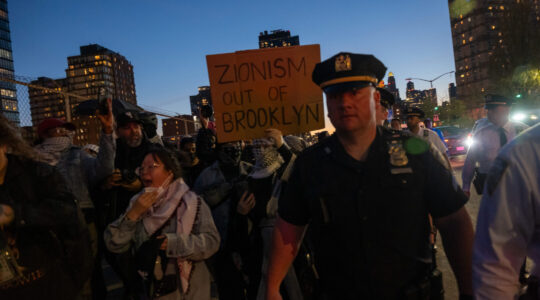Jerusalem — Women of the Wall’s 25th anniversary prayer service this week at the Kotel was a model of sisterly unity.
For a few hours, anyway.
Although some members of the group are deeply upset about its board’s conditional acceptance of a governmental proposal that would result in WOW praying in a third, as-yet-to-be built egalitarian prayer space close to — but not at — the existing Western Wall plaza, the opposing factions of WOW managed to put aside their differences during the duration of the anniversary event.
On Monday, several hundred WOW members and their supporters, including about 150 from abroad, gathered for what many said was the most meaningful service in the group’s 25-year history.
Unlike previous months, when ultra-Orthodox seminary students tried to stand in their way, WOW succeeded in securing a large space toward the back of the women’s section. Despite the best efforts of Rabbi of the Western Wall Shmuel Rabinowitz to drown out the women’s prayers with a loudspeaker, the amplification system abruptly stopped a third of the way through WOW’s service, reportedly because the police shut it off.
Many of the women wore colorful prayer shawls and kippot. Denied the right to pray directly from a Torah scroll, the women, linked by a wireless acoustic system via earphones, took turns reading from a Chumash. More than a hundred male supporters stood behind the group, separated by a barrier.
Protected by policewomen, and with many hundreds of disapproving seminary girls and older haredi women, some of them jeering, looking on, WOW members placed several girls, each holding an empty Torah cover, on their shoulders to call attention to Rabbi Rabinowitz’s prohibition.
Once prayers ended, many of the participants, including the dissenters, attended conference sessions devoted to WOW, its values and future, as well as a gala dinner.
Anat Hoffman, chairwoman of the organization, told The Jewish Week that the dissenters — who are vowing to continue to fight for the right of women to pray at the traditional Kotel, with a Torah scroll — “are a very small minority” of WOW members.
“These women are very dear to us and they celebrated with us at the gala. They are part of Women of the Wall and we wouldn’t be here without them. We differ now on what to do next. While we very much respect their opinion, the board made its decision,” she said.
Hoffman said the board repeatedly refused to agree with the compromise put forth by Jewish Agency Chairman Natan Sharansky and the Mandelblit Committee charged with finding a solution to end ongoing tensions on Rosh Hodesh.
The board came around “once we understood that what motivates the government is the desire for peace and quiet at the holiest site for the Jewish people, and not pluralism or equality.”
Hoffman said the board believed that unless it agreed to pray in the egalitarian section, the government would pass legislation that would, by authorizing an ultra-Orthodox authority to decide what is acceptable “local custom,” completely ban women’s prayer groups at the Kotel.
“There was talk with us directly and in the media that the government will draft regulations as to who decides what is local custom,” Hoffman said.
Several months ago Jerusalem District Court Judge Moshe Sobel ruled that WOW was not violating local custom, currently a vague term with no clear cut definition or standards.
When WOW met with Sharansky, “it took us a long time to hear him,” Hoffman said. “He basically said we can find a place for WOW at the [new section of the] Western Wall, and you can be partners in the planning and implementation. But you’ll have to give up something, too.”
The sacrifice entails praying at a distance from the Kotel itself.
“We demanded change and now we have been asked to make a painful shift. My heart goes out to the few sisters who are not parting from [WOW’s] manifesto. I wish I could be like them … and strive for a pure and complete victory. I think the board’s true leadership has been to read the reality and to maximize what we can do in this reality.”
Hoffman insisted that WOW will continue to pray in the women’s section unless the government meets the organization’s many preconditions, including the authority to help make policy at the new space.
♦
From its very first prayer service, WOW has encountered resistance, sometimes violent, from ultra-Orthodox Jews who believe the group violates Jewish law. As a result of the group’s prayers, in 1989 the Ministry of Religion and the Ministry of Justice issued regulations prohibiting any religious ceremony “not in accordance with the custom of the holy site and which offends the sensitivities of the worshipers at the place.”
Launched during the First International Jewish Feminist Conference held in Jerusalem at the end of 1988, Women of the Wall has been pushing the envelope of feminist religious expression ever since. Their stated goal is to “wear prayer shawls, pray and read from the Torah collectively and out loud at the Western Wall.”
Acceptance has grown slowly but steadily, but many Israelis still consider the group to be more of an American import than a homegrown movement. On a typical Rosh Chodesh, the group attracts North American immigrants and, increasingly, their Israeli-born children as well as many rabbinical and cantorial students studying in Jerusalem for the year.
♦
Cheryl Birkner Mack, a board member who resigned over the compromise, said she and 20 others opposed to praying in the new prayer space sent a letter to Minister of Religious Services Naftali Bennett last week stating that they have no intention of giving up the fight.
“The legality of what we seek to do has been upheld unconditionally in the Sobel ruling of April 2013, which also stated that our [prayer] is in accord with the custom of the place’ at the Kotel. This ruling, which built on the 2003 Supreme Court ruling on our case, grants all that we have sought all these years. We are committed to our dream and to the work needed to fully realize and sustain it,” the letter said.
Mack said she and many WOW supporters do not consider Robinson’s Arch part of the Kotel.
“Nothing has changed. Bigger, better and prettier doesn’t increase the arch’s holiness,” she said, adding that Hoffman held the same position just a few months ago.
Mack, who voted against the compromise, said the dissenters are also “upset” by the board’s narrow decision-making process; that process bypassed what used to be called the International Committee for Women of the Wall, a group that included the organization’s founders, “women who raised money to buy a Torah scroll and to take our case to the High Court.”
Had the board voted the same way after consulting with these women, “I might not have left the board,” Mack said.
Arguably most upsetting, Mack said, is the understanding that “by leaving the women’s section, we’ve said to the bullies and the cursers and those who are violent, ‘You’ve won, you get your space.’ In our minds the state of Israel should never let that happen. This struggle is far bigger than the Kotel. It is a struggle for the rights of all Jews at all holy sites.”
Given Judge Sobel’s ruling, she said, “this seems like a strange time to give up the rights we’ve been granted. Right now we have a supportive government” with no ultra-Orthodox parties in the coalition.
Mack said that many of the WOW supporters who attended the anniversary events “either were unaware the vote had taken place or didn’t understand its implications.” She believes “many” will join the dissenters group.
Despite the rift, Mack said she attended the prayer session, seminar and gala — which she largely organized — “because of my loyalty to the cause.
“That will not change,” she said.
The New York Jewish Week brings you the stories behind the headlines, keeping you connected to Jewish life in New York. Help sustain the reporting you trust by donating today.




